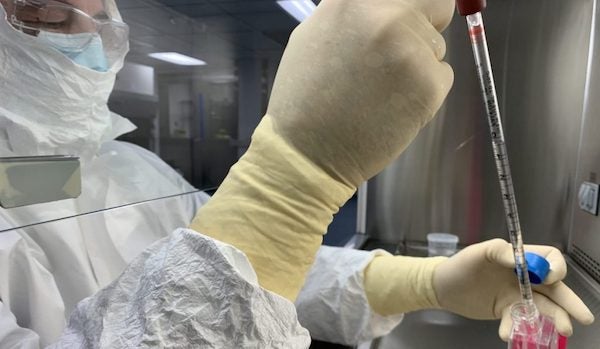University of Rhode Island College of Pharmacy investigators continue to grow and expand the research goals of the college through securing collaborations and funding with private and federal sponsors.
Below is a list of COP-led projects that were funded at the university between July 1, 2023 and December 31, 2023.
 Jessica Alber
Jessica Alber
Alzheimer’s Disease Risk and Biomarker Disclosure (Dec. 1, 2023, Butler Hospital, $9,901). The aim of this study is to establish a multi-national cohort of individuals who are deeply phenotyped for Alzheimer’s disease biomarkers – meaning they have brain imaging, blood, and retinal tests done and are followed over time to study the natural course of the disease.
Bongsup Cho
 RI-INBRE CRCF Instrument Supplement (July 20, 2023, National Institute of General Medical Sciences/NIH/DHHS, $197,825). The Instrument Supplement application funding will allow the RI-INBRE Centralized Research Core Facility (CRCF) to acquire a Monolith X instrument from NanoTemper Technologies. Monolith X will complement the facility’s current Biacore T200 Surface Plasmon Resonance (SPR) system and provide entry and medium-level users with an efficient and expedited process for retrieving experiment results.
RI-INBRE CRCF Instrument Supplement (July 20, 2023, National Institute of General Medical Sciences/NIH/DHHS, $197,825). The Instrument Supplement application funding will allow the RI-INBRE Centralized Research Core Facility (CRCF) to acquire a Monolith X instrument from NanoTemper Technologies. Monolith X will complement the facility’s current Biacore T200 Surface Plasmon Resonance (SPR) system and provide entry and medium-level users with an efficient and expedited process for retrieving experiment results.
Rhode Island IDeA Network of Biomedical Research Excellence Workforce Development (RI-INBRE WDT) (July 19, 2023, RI Dept of Labor & Training, $280,905). RI-INBRE proposes leveraging its well-maintained core facilities and collaborative network to create a new ‘micro-credential-based’ Workforce Development Training (WDT) program. RI-INBRE will offer 8 short-term biomedical skill set training modules. This program will be provided to the students participating in summer research fellowship programs at 9 RI-INBRE network institutions. The program is funded in collaboration with MJ Kanaczet, Director of Workforce Development as part of URI’s Real Jobs Rhode Island partnership, Transforming Health in RI, with the RI Department of Labor and Training.
Jeffrey Bratberg
 Pharmacy-Based Buprenorphine Induction and Maintenance: A Real-World Demonstration Project (Oct. 18, 2023, Foundation for Opioid Response Efforts, $455,797). Pharmacists in Connecticut and Ohio will be trained to prescribe buprenorphine and provide maintenance care to people with opioid use disorder as part of a demonstration program that aims to increase access to treatment. As part of the project, investigators will also conduct a state-by-state review of pharmacy regulations to understand the barriers and facilitators to pharmacy-based buprenorphine care.
Pharmacy-Based Buprenorphine Induction and Maintenance: A Real-World Demonstration Project (Oct. 18, 2023, Foundation for Opioid Response Efforts, $455,797). Pharmacists in Connecticut and Ohio will be trained to prescribe buprenorphine and provide maintenance care to people with opioid use disorder as part of a demonstration program that aims to increase access to treatment. As part of the project, investigators will also conduct a state-by-state review of pharmacy regulations to understand the barriers and facilitators to pharmacy-based buprenorphine care.
Aisling Caffrey
 Comparative Effectiveness and Complications of Intravenous Ceftriaxone Compared with Oral Doxycycline in Lyme Meningitis (Oct. 26, 2023, The Children’s Hospital Corporation d/b/a Boston Children’s Hospital, $10,327). Lyme meningitis is an uncommon but potentially serious clinical manifestation of Lyme disease. Intravenous ceftriaxone had been the first-line treatment for Lyme meningitis, but is associated with a high rate of complications, while efficacy and effectiveness (or real-world evidence) data for oral doxycycline are limited. Our goal is to compare oral doxycycline with intravenous ceftriaxone for the treatment of Lyme meningitis on short-term recovery and long-term quality of life.
Comparative Effectiveness and Complications of Intravenous Ceftriaxone Compared with Oral Doxycycline in Lyme Meningitis (Oct. 26, 2023, The Children’s Hospital Corporation d/b/a Boston Children’s Hospital, $10,327). Lyme meningitis is an uncommon but potentially serious clinical manifestation of Lyme disease. Intravenous ceftriaxone had been the first-line treatment for Lyme meningitis, but is associated with a high rate of complications, while efficacy and effectiveness (or real-world evidence) data for oral doxycycline are limited. Our goal is to compare oral doxycycline with intravenous ceftriaxone for the treatment of Lyme meningitis on short-term recovery and long-term quality of life.
 Richard Clements
Richard Clements
Cardiopulmonary Vascular Biology COBRE Clements Subaward (Nov. 20, 2023, Ocean State Research Institute Inc, $257,748). This project focuses on defining problems with cardiac energy production associated with heart failure caused by pulmonary hypertension. It is part of a larger project with multiple investigators involving pulmonary hypertension pathology including cardiac arrythmia and fibrosis.
Phillip Clark (Gerontology), Christine Eisenhower, Erica Estus and Anne Hume
Rhode Island Geriatrics Workforce Enhancement Program (RI-GWEP). (July 10, 2023, Sept. 1, 2023, Health Resources and Services Administration/DHHS, $872,011). The main objective of this grant, led by Phillip Clark, is to develop and implement interprofessional geriatrics education in primary care settings to improve health outcomes for older adults by integrating geriatrics into primary care delivery systems to provide coordinated, comprehensive, patient/family-centered health care. Additional goals include student training and patient education.
Claudia Fallini
 Dissecting the molecular link between stroke, actin, and Alzheimer’s Disease (Sept. 22, 2023, National Institutes of Health/DHHS, $187,504). In this project, we will investigate the molecular and cellular pathways that link stroke to an increased risk of developing Alzheimer’s disease using iPSC-derived human neurons. Our research will contribute to the identification of novel targets for the development of biomarkers and/or innovative therapeutic strategies for Alzheimer’s disease and other neurodegenerative diseases.
Dissecting the molecular link between stroke, actin, and Alzheimer’s Disease (Sept. 22, 2023, National Institutes of Health/DHHS, $187,504). In this project, we will investigate the molecular and cellular pathways that link stroke to an increased risk of developing Alzheimer’s disease using iPSC-derived human neurons. Our research will contribute to the identification of novel targets for the development of biomarkers and/or innovative therapeutic strategies for Alzheimer’s disease and other neurodegenerative diseases.
Anita Jacobson
 URI Community First Responder Program (Aug. 19, 2023, Substance Abuse & Mental Health Services Administration, $630,064). Establish and maintain the Northeast Regional Rural Opioid Technical Assistance Center to provide opioid use disorder education and resources to New Englanders.
URI Community First Responder Program (Aug. 19, 2023, Substance Abuse & Mental Health Services Administration, $630,064). Establish and maintain the Northeast Regional Rural Opioid Technical Assistance Center to provide opioid use disorder education and resources to New Englanders.
RIDOH – CFRP Project (Aug, 3, 2023, RI Department of Health, $475,272). Purchasing the opioid antagonist and overdose reversal agent naloxone for distribution via the Community First Responder Program to the general public and community non-profit partner organizations.
Mary-Jane Kanaczet
 Transforming Health in RI: Med Tech Training 4 (Dec. 6, 2023, RI Department of Labor & Training, $186,595). The State Approved Medication Training Program in Drug Administration trains licensed Certified Nursing Assistants in RI Department of Health-approved facilities to become medication technicians, responding to the urgent need for qualified staff licensed to administer medications to residents in rehab facilities, short- and long-term healthcare facilities, and assisted living facilities. The program fills an important gap in the healthcare workforce while creating career ladder opportunities.
Transforming Health in RI: Med Tech Training 4 (Dec. 6, 2023, RI Department of Labor & Training, $186,595). The State Approved Medication Training Program in Drug Administration trains licensed Certified Nursing Assistants in RI Department of Health-approved facilities to become medication technicians, responding to the urgent need for qualified staff licensed to administer medications to residents in rehab facilities, short- and long-term healthcare facilities, and assisted living facilities. The program fills an important gap in the healthcare workforce while creating career ladder opportunities.
Transforming Health in RI: Medication Technician Program 3 (July 13, 2023, RI Dept of Labor & Training, $37,563). The State Approved Medication Training Program in Drug Administration is conducted in collaboration with the URI Office of Strategic Initiatives and facilitated by URI College of Pharmacy faculty to train Certified Nursing Assistants in the proper administration of medications as part of URI’s Real Jobs RI Transforming Health in RI workforce development partnership.
Kerry LaPlante
 Development and Risk Assessment for Fully Weight-Bearing Antibiotic-Eluting Joint Implants (Nov. 7, 2023, Massachusetts General Hospital, $25,942). This project’s long-term goal is to provide a new, safe, and efficient implant for combating periprosthetic joint infection (PJI), which can eliminate the costly and burdensome gold standard of two-stage revision with temporary immobilization. The rationale for the proposed research is that by using a newly discovered antibiotic synergy between local PJI antibiotics and commonly used analgesics, we can optimize drug elution profiles with maximum efficacy in preventing the growth of clinically relevant infections of variable risk. Dr. LaPlante is a co-investigator on this project and will utilize pharmacodynamic and staphylococcus infections expertise to determine optimal synergistic concentrations of antibiotics with analgesics.
Development and Risk Assessment for Fully Weight-Bearing Antibiotic-Eluting Joint Implants (Nov. 7, 2023, Massachusetts General Hospital, $25,942). This project’s long-term goal is to provide a new, safe, and efficient implant for combating periprosthetic joint infection (PJI), which can eliminate the costly and burdensome gold standard of two-stage revision with temporary immobilization. The rationale for the proposed research is that by using a newly discovered antibiotic synergy between local PJI antibiotics and commonly used analgesics, we can optimize drug elution profiles with maximum efficacy in preventing the growth of clinically relevant infections of variable risk. Dr. LaPlante is a co-investigator on this project and will utilize pharmacodynamic and staphylococcus infections expertise to determine optimal synergistic concentrations of antibiotics with analgesics.
Simulated Humanized Patient Regimens and Epithelial Lining Fluid Concentrations of Meropenem/Vaborbactam, Meropenem alone, or Ceftazidime/Avibactam against Carbapenem-Resistant Enterobacteriaceae in a One Compartment In-Vitro Pharmacodynamic Model: A Novel Pharmacokinetic Approach (Aug. 22, 2023, Melinta, $140,508). Carbapenem-resistant Enterobacterales (CRE) are listed as urgent threats on the CDC’s antimicrobial resistance threat report. Invasive infections due to CRE are associated with mortality rates between 20% and 50%. The most frequent organisms classified as non-carbapenemase producing CRE are Enterobacter species with up to 76% of isolates defined as CRE not harboring carbapenemase genes. Mutations in outer membrane porins (omp) are present in up to 62% of non-carbapenemase producing CRE, however, meropenem often retains in vitro activity. We aimed to compare efficacy of ceftazidime/avibactam and meropenem in both serum and ELF concentrations while measuring for susceptibility changes in a 5-day in vitro pharmacodynamic model.
Marin Manuel
 Transcriptomic profile of functionally identified mouse spinal motoneurons (Sept. 15, 2023, Brown University, $19,947). This project aims to investigate the molecular pathways underlying the selective vulnerability of different types of motor neurons in ALS. We will use innovative techniques to functionally identify motor neuron types and analyze their transcriptomes. By understanding the differences in gene expression between these neuron types, we hope to identify novel therapeutic targets for ALS.
Transcriptomic profile of functionally identified mouse spinal motoneurons (Sept. 15, 2023, Brown University, $19,947). This project aims to investigate the molecular pathways underlying the selective vulnerability of different types of motor neurons in ALS. We will use innovative techniques to functionally identify motor neuron types and analyze their transcriptomes. By understanding the differences in gene expression between these neuron types, we hope to identify novel therapeutic targets for ALS.
Marin Manuel, Katharina Quinlan

 Serotonin based therapeutics in cerebral palsy (Aug. 7, 2023, National Institutes of Health/DHHS, $636,590). This project focuses on developing serotonin-based therapeutics for cerebral palsy (CP), using a rabbit model. Previous research indicates that excessive serotonin activity contributes to hypertonia, and this study aims to identify postnatal milestones in motor unit development, determine 5HT receptor(s) responsible for hypertonia, and evaluate the effects of a serotonergic antagonist. The study seeks to provide preclinical evidence for novel therapies that may reduce spasticity in CP, potentially utilizing FDA-approved serotonergic drugs to improve outcomes in at-risk children.
Serotonin based therapeutics in cerebral palsy (Aug. 7, 2023, National Institutes of Health/DHHS, $636,590). This project focuses on developing serotonin-based therapeutics for cerebral palsy (CP), using a rabbit model. Previous research indicates that excessive serotonin activity contributes to hypertonia, and this study aims to identify postnatal milestones in motor unit development, determine 5HT receptor(s) responsible for hypertonia, and evaluate the effects of a serotonergic antagonist. The study seeks to provide preclinical evidence for novel therapies that may reduce spasticity in CP, potentially utilizing FDA-approved serotonergic drugs to improve outcomes in at-risk children.
 Jyothi Menon
Jyothi Menon
Evaluation of Inflammatory Effects of Microplastics on 3D Tissue-engineered Liver Models (RI-INBRE $30,000). The goal of this project is to develop 3D-printed liver tissue models which will then be used to determine the effects of nano- and micro-plastics following uptake by liver cells.
Jyothi Menon, Matthew Bertin, Ruitang Deng, Ami Vyas
Multifunctional Nanoparticle Platform to Prevent Alcohol-Associated HCC Development (July 3, 2023, National Cancer Institute/NIH/DHHS, $287,372). The goal of this project is to develop a nanoparticle formulation that can provide targeted and localized anti-fibrotic therapy in alcohol-associated fibrosis to prevent its progression to hepatocellular carcinoma (HCC).
Katharina Quinlan
 (July 10, 2023, National Institutes of Health/DHHS, $600,871). This project explores the potential to treat cerebral palsy through modulation of spinal neural networks which are disrupted during development by injury. Parallel, longitudinal studies will quantify timing and development of abnormalities in sensorimotor integration in children with cerebral palsy and in a rabbit model where we can more directly investigate altered properties of spinal neurons and neuronal circuits.
(July 10, 2023, National Institutes of Health/DHHS, $600,871). This project explores the potential to treat cerebral palsy through modulation of spinal neural networks which are disrupted during development by injury. Parallel, longitudinal studies will quantify timing and development of abnormalities in sensorimotor integration in children with cerebral palsy and in a rabbit model where we can more directly investigate altered properties of spinal neurons and neuronal circuits.
RI – TRPV4 Links the Blood-Nerve Barrier to Motor Neuron Dysfunction (July 19, 2023, Johns Hopkins University, $76,225). Increased permeability of blood-neural barriers (BNBs) has been implicated in the pathogenesis of many neurological disorders. This study addresses how mutations of the transient receptor potential vanilloid 4 (TRPV4) cause disruptions in the BNB which result in spinal muscular atrophy and Charcot-Marie-Tooth. The Quinlan lab is characterizing the effect of this mutation on spinal reflex circuits.
Validation of prenatal rabbit hypoxia ischemia as a model of cerebral palsy-induced pain (Sept. 18, 2023, National Institute of Neurological Disorders and Stroke/NIH/DHHS, $2,617,920). Pain is the most common co-morbidity of cerebral palsy yet very little is known of the pathophysiology. This project will validate an established, non-rodent, rabbit model of cerebral palsy (based on prenatal hypoxia-ischemia) with prominent motor dysfunction for use in studying the coincidence of pain and motor deficits. This study focuses on pain within the context of developmental injury.
Jaime Ross
 Lifecycle of Microplastics in the Body and Their Contribution to Alzheimer’s Disease (RI-INBRE $30,000 and URI Plastics Initiative $10,000). Microplastics (less than 5 millimeters) are either purposely produced or derived from larger plastics and have entered into the air, water system, and food chain. Effects of microplastics on human health has not been evaluated and too little is known about their danger. To fill this gap, we are studying microplastics exposure on brain health and contribution to neurodegenerative disease.
Lifecycle of Microplastics in the Body and Their Contribution to Alzheimer’s Disease (RI-INBRE $30,000 and URI Plastics Initiative $10,000). Microplastics (less than 5 millimeters) are either purposely produced or derived from larger plastics and have entered into the air, water system, and food chain. Effects of microplastics on human health has not been evaluated and too little is known about their danger. To fill this gap, we are studying microplastics exposure on brain health and contribution to neurodegenerative disease.
David Rowley
 Molecular Mechanisms of Interspecies Interactions In Mitigating Aquaculture Diseases (Aug. 29, 2023, National Institute of Food and Agriculture/US Department of Agriculture, $54,400). The objective of this collaborative USDA grant between researchers in the CoP and CELS is to elucidate the molecular mechanisms that underpin interactions between probiotic and pathogenic bacteria. A long-term goal is the development of safe and effective probiotic treatments to mitigate the effects of infectious disease outbreaks in aquaculture facilities.
Molecular Mechanisms of Interspecies Interactions In Mitigating Aquaculture Diseases (Aug. 29, 2023, National Institute of Food and Agriculture/US Department of Agriculture, $54,400). The objective of this collaborative USDA grant between researchers in the CoP and CELS is to elucidate the molecular mechanisms that underpin interactions between probiotic and pathogenic bacteria. A long-term goal is the development of safe and effective probiotic treatments to mitigate the effects of infectious disease outbreaks in aquaculture facilities.
David Rowley, Matthew Bertin, Christopher Hemme, Elizabeth Leibovitz
Hands-on Education and Research for Biomedical and Analytical Learning (HERBAL) (7/3/2023, NIH – National Institutes of Health /DHHS, $267,680). HERBAL, Hands-on Education and Research for Biomedical and Analytical Learning, will engage Rhode Island high school students in research activities to encourage interest in STEM careers and enhance STEM identity. During the academic year, students will complete game-based classroom modules to teach theory and methods of medicinal plant analysis. Summer sessions will allow students to gain hands-on experience with cutting-edge instrumentation available at URI.
 William Van Nostrand
William Van Nostrand
Lilly ARIA Project (Dec. 4, 2023, Eli Lilly and Company, $519,454). This project will study how Alzheimer’s disease immunotherapies can potentially cause adverse events including bleeding in the brain. The investigations here will focus on molecular changes in cerebral blood vessels that can cause these deleterious side effects using novel rat models for cerebral amyloid angiopathy.
A Translational Approach Toward Understanding Brain Waste Clearance in Cerebral Amyloid Angiopathy (Dec. 29, 2023, Leducq Foundation for Cardiovascular Research, $126,499). This project is part of a transatlantic consortium to investigate perturbation of brain clearance mechanisms that contribute to the development of cerebral amyloid angiopathy. We will use new gene-edited rodent models for cerebral amyloid angiopathy to perform measures of solute clearance routes from the brain and correlate with molecular measures of vascular pathology.

 Ami Vyas, Britny Brown
Ami Vyas, Britny Brown
Systematic Literature Review of Cancer Disease Characteristics (Sept. 1, 2023, funding source subject to NDA; Vyas – $70,341; Brown – $9,560). This project will systematically summarize the real-world evidence on algorithms, measures, criteria, or such techniques of assessing key characteristics of cancer and cancer specific outcomes. Further details will be made available upon publication.

